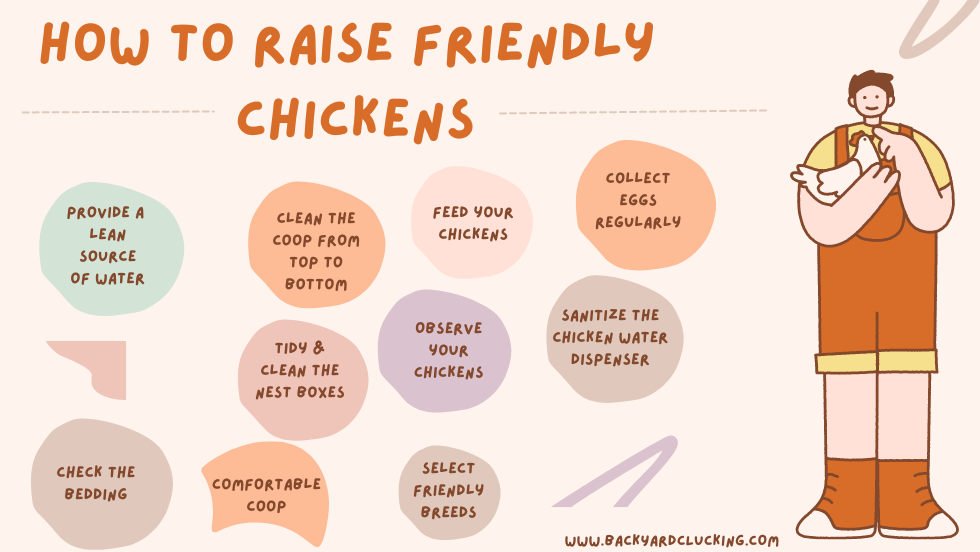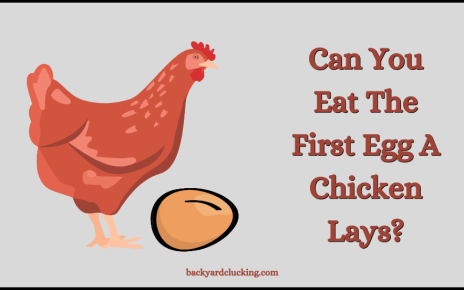Are you searching for ways to raise friendly chickens? If so, then you’ve come to the right place. Raising chickens can be a rewarding experience and an excellent way to provide fresh eggs daily, but it requires more than just purchasing a flock and nourishing food. Chickens need proper housing, nutrition, and attentive care to thrive, ensuring they are as friendly as possible.
In this blog post, we will explore how to raise your backyard flock of genuinely friendly chickens filled with personalities eager to interact with their humans! We will discuss the best practices, from choosing the right breed of chicken for maximum friendliness through socializing techniques explicitly designed for cultivating confidence and trust between chicken-human pairs.
So let’s begin our journey towards creating happy coops full of warm-hearted feathered friends.
Special Care Tips: How to Raise Friendly Chickens
Below are best tips I discussed, With these best tips in mind —even first-time owners will be able join the ranks of proud poultry parents.
Tip #1: Choose Friendliest Chicken Breeds
When choosing chickens for your flock, it’s essential to select breeds known for their friendly and pleasant natures. The 5 best friendliest breeds I have include:
1]. Silkies
- Average Size: Rooster 36 oz., Hen 32 oz.
- Personality Traits: Friendly, Docile, Laid-back, Good around kids
The Silkie chicken is known for its calm and friendly nature and soft, fluffy feathers. They make excellent brooders and are easily tamed by their owners due to their gentle demeanor.
They got their name from their fantastic plumage, made of soft feathers without feather barbs. This lack of barbs gives their feathers a soft and fluffy appearance.
Silkies also have the unique trait of having black skin and muscle. They are feather-footed (which means they have feathers on their feet) and have five toes (while most chickens have four toes on each foot). Silkies also sport a crest, a tuft of feathers on head. Some varieties even have a beard, which is feathers below their beak. How cool is that?
Why Are Silkies Ideal For Pets?
Silkies are truly remarkable creatures, adapting effortlessly to confinement and even proving to be excellent house pets. Their laid-back and docile personality makes them a joy to be around.
And if you’re looking for a mother hen, Silkie hens are top-notch. They eagerly embrace the task of hatching any eggs you entrust to them.
However, it’s important to note that Silkies are not skilled aviators. Their feathers lack the necessary structure to support flight, which doesn’t hinder their charm.
While considering the Silkie chicken breed, it’s vital to remember that extreme temperatures are not their forte. Their feathers, though splendid, do not offer sufficient insulation in hot or cold climates.
2]. Speckled Sussex
- Average size: Rooster 8lbs, Hen 6.5lbs
- Personality Traits: Friendly, Calm, Easy going
The Speckled Sussex chicken is a docile breed known for its friendly and social nature. It makes an ideal pet due to its calm demeanor and unique coloring (ranging from light to dark brown with speckles of black).
Speckled Sussex chickens are also low-maintenance and easy to care for. They adapt well to confined areas as long as they have plenty of room to roam.
They are excellent free-range birds, excelling in foraging and finding food while remaining friendly toward their owners.
Why Are Speckled Sussex Ideal For Pets?
These chickens are also known for their egg-laying capabilities, with hens capable of laying up to 200 eggs annually. They lay beautiful large brown eggs that are ideal for baking and other cooking purposes.
The Speckled Sussex is an excellent choice for novice chicken owners due to its friendly nature and easy-to-care-for nature.
3]. Buff Orpington
- Average Size: Rooster 8.5lbs, Hen 6-7lbs
- Personality Traits: Friendly, Calm, Good with Children
The Buff Orpington is ideal for the backyard farmer due to its friendly and calm nature. This large breed is a favorite among poultry enthusiasts because of its docile disposition and golden buff color.
This chicken breed also has an exceptional mothering instinct and is known to be a reliable broody hen. Buff Orpingtons are also good layers, capable of producing up to 200 large brown eggs per year.
Buff Orpington’s docile temperament makes it an ideal pet for families with children. They enjoy being handled and are content to be held for long periods.
Why Are Buff Orpingtons Ideal For Pets?
The Buff Orpington’s amicable nature makes it an excellent choice for those looking for an easy-going pet that does not require much attention. It is also known to be quite relaxed, adapting well to confinement and providing hours of entertainment to its owners.
Additionally, these birds are pretty hardy and can easily withstand most climates. They have an abundance of fluffy feathers that provide adequate insulation in both hot or cold temperatures.
4]. Cochin:
- Average size: Rooster 11lbs, Hen 8.5lbs
- Personality Traits: Friendly, Calm, Good with Children
The Cochin chicken is a breed renowned for its friendly and pleasant disposition. Its easygoing nature makes it an excellent pet for families with children.
Cochins come in various colors but are most commonly found in black, white, buff, and blue. They boast an abundance of feathers that give them their signature fluffy appearance.
These chickens make excellent mothers, and hens can often be seen sitting on a clutch of eggs for weeks at a time.
Why Cochin Breeds Are Ideal Pets?
Cochin chickens are the perfect choice for an easy-going, low-maintenance pet. They do not require much attention and are happy to be confined to their run or living area without fuss.
They can easily withstand cold temperatures due to their abundance of feathers, making them an excellent choice for those in colder climates.
Cochins are also known as one of the best egg-laying breeds, with hens capable of producing up to 200 large brown eggs annually.
5]. Australorp
Average Size: Rooster 8.5lbs, Hen 6-7lbs
Personality Traits: Friendly, Docile, Good with Children
The Australorp chicken is a docile breed renowned for its friendly and calm nature. It has an easy-going personality making it an ideal pet for families with children.
Australorps come in various colors, from black to white and even blue. They have attractive plumage with glossy black feathers and short yellow legs.
These birds are also excellent layers, capable of producing up to 200 large brown eggs per year.
Why Australorp Breeds Are Ideal For Pets?
Australorp chickens are an excellent choice for those looking for an easy-going, low-maintenance pet. They do not require much attention and are content to be confined to their run or living area without any fuss.
They can also easily withstand cold temperatures due to their abundance of feathers, making them an excellent choice for those in colder climates.
Their friendly and docile temperament makes them a joy to be around. They are content to follow their owners everywhere, foraging and exploring with an eagerness to bring smiles all-around.
Check out following breeds if you are looking to add more friendly breeds to your backyard flock:
- Rhode Island Reds
- Plymouth Rocks
- Brahma
- Red or Black Stars (hybrid)
- Sebright (bantam)
- Wyandotte
- Easter Eggers (hybrid)
Tip #2: Special Care For Baby Chicks
If you want your little chicks to grow up to be friendly chickens, you must start making friends with them when they’re young. It is just like how they become best buddies with their mother hen. If we care for them, we’re like their mommy hen, and they’ll start to like us a lot if we spend lots of time with them.
Remember that baby chicks get tired quickly and need lots of sleep, so don’t play with them too long. Visit them a few times a day for a little while.
And remember that they need to stay warm, so keep them from their warm light for too long. If they start chirping a lot, they’re telling you they want to return to their warm place.
At first, just let them get used to seeing your hand. Talk to them softly and move slowly so you don’t scare them.
Soon, they’ll let you pet them and even pick them up. But remember, their little bodies are very delicate, so be super gentle.
When little kids want to hold the chicks, always watch them. Teach the kids to have the chick gently, like they’re holding a baby.
This way, the chick will feel safe, and the kid won’t squeeze too hard or let the chick fall.
Just like us, chicks love snacks. You can give them little treats sometimes, but only a little. This way, they’ll start to think that you’re a friend who brings them yummy snacks.
By giving them attention early on and getting them used to gentle touch, you can create a lifelong bond between you and your chickens. And you’ll be rewarded with friendly birds for years to come.
Tip #3: Setting Up a Comfortable Coop
To provide a safe and comfortable environment for your chickens, follow these tips for setting up a chicken coop:
Size: Plan for at least 3-4 square feet of space per chicken inside the coop and 10 square feet per chicken in the outdoor run.
Ventilation: Ensure proper ventilation to regulate temperature and keep humidity in check.
Predator Protection: Set up reinforced fencing and use hardware cloth on windows and doors to prevent predators from entering the coop.
Roosting Space: Include roosting bars where the chickens can perch and sleep at night, allowing at least 8-10 inches of roosting space per chicken.
Nesting Boxes: Provide one nesting box for every 4-5 hens for egg-laying, placing them in a quiet, dark coop area.
Tip #4: Feeding Your Chickens With Love
Follow this basic feeding schedule to ensure they receive adequate nutrition:
Starter Feed: Provide chicks with starter feed containing 20-24% protein for the first 6-8 weeks.
Grower Feed: Switch to grower feed with 16-18% protein for weeks 9-18.
Layer Feed: Once the hens start laying eggs, provide a layer feed with 15-18% protein.
Grit and Oyster Shells: Offer grit for optimal digestion and oyster shells as a source of calcium to strengthen eggshells.
Fresh Water: Keep a constant supply of fresh water available for your chickens.
Tip #5: General Health Care
Regular health checks are crucial in keeping your new guest [chicken] healthy and happy. Keep an eye out for the following:
Feather Quality: Check for missing or damaged feathers, which could indicate mites or lice.
Weight: Excessive weight loss or gain could signal illness or dietary issues.
Respiratory Health: Monitor your chickens for wheezing, sneezing, or nasal discharge – signs of respiratory infection.
Parasite Control: Administer regular deworming treatments and ensure proper coop sanitation.
Vaccinations: Consult your veterinarian regarding necessary vaccinations for your area.
Tip #6: Bonding with Your Chickens
Developing a healthy relationship with your chicks will contribute to their overall well-being. Try these bonding techniques:
Spend Quality Time: Spend time around your chickens, observing them and making them familiar with your presence.
Talking to Them: Gently speak to your chickens to help them recognize your voice and associate it with a positive presence.
Handling: Hold your chickens regularly, being gentle and patient as they learn to trust you.
Positive Reinforcement: Reward good behavior with treats like mealworms or scratch.
Coop Comfort: Ensure the coop is comfortable and secure for your chickens by providing adequate space, ventilation, and predator protection.
Tip #7: Provide Safe & Stress Free Environment
Creating a safe and stress-free environment for your chickens is essential to their well-being. Here are some tips on how to do that:
- Make sure the coop has ample space, ventilation, and predator protection.
- Provide plenty of fresh food and water regularly.
- Give them plenty of room to roam outside in a secure run.
- Regularly check for any signs of distress or illness.
- Make sure the coop is clean and free from any pests.
- Give them plenty of enrichment activities to keep them happy and busy. This can be done with hanging puzzles, swings, treat balls, and other toys.
Tip #8: Common Issues to Watch Out For
It’s important to stay vigilant when raising any livestock. Fortunately, chickens are a generally hardy breed with few health issues. Keep an eye out for the following problems:
- Mites and Lice: These parasites can cause discomfort and loss of feathers. Treat with an appropriate mite or lice powder from your local feed store.
- Coccidiosis: This disease is caused by a protozoan parasite that attacks the digestive system, leading to diarrhea and weight loss. Treatment involves a course of medication prescribed by your vet.
- Avian Influenza: Vaccinating your chickens can prevent this highly contagious respiratory virus.
Tip #9: Troubleshooting Common Issues
When raising backyard chickens, it’s essential to be prepared for common issues that may arise. Here are some simple tips to troubleshoot any problems you might encounter with your chickens:
- Molting: This natural process usually occurs in late summer or early fall and can involve heavy feather loss. Provide extra protein during this period to help your chickens regain their feathers quickly.
- Feather Picking: This behavior is usually caused by boredom or overcrowding, so provide your chickens with plenty of space and enrichment activities, such as hanging cabbage heads or other foraging materials.
- Overcrowded Nest Boxes: If hens are fighting over nesting boxes, you may need to add additional boxes. Ensure one box for every four to five hens, and keep them in a quiet and dark area.
- Eggs Not Hatching: This can be caused by various issues, such as incorrect incubator conditions or a hen’s age. Speak to an expert about proper incubation practices, and consider getting younger hens if your current ones are too old to reproduce.
More Special Treat Tips:
Chens adore treats. Those tempting table scraps, juicy fruits, delicious mealworms, or tasty cracked corn come running in no time. You’ll notice their trust growing as you sit nearby and watch them eat.
Gradually, you can move the food closer to you. And guess what? You can even try placing treats in your hand to see if they’ll eat from it. If they do, it’s a sure sign that they’ve put their trust in you.
Now, when handling these feathery friends, why not entice them to hop on your lap for some delicious treats? But remember, be cautious, as their pecking can sometimes be painful.
As they indulge in their pleasures, gently stroke and pet them. You’ll be amazed to see how many chickens adore the attention and even seek you out, even when you don’t have any treats to offer them.
Summary
Raising backyard chickens can be a rewarding and enjoyable experience. Providing them with the proper nutrition, health care, environment, and enrichment activities is essential to ensure their well-being.
Regularly monitor your birds for signs of distress or illness, and administer any necessary vaccinations to help keep them healthy. Ensure they have enough space to roam outside in a secure run, and provide plenty of fresh food and water. Develop a bond with your birds by talking to them, handling them gently, and rewarding good behavior with treats.
Finally, watch for common issues such as mites or lice, coccidiosis, avian influenza, molting, feather picking, overcrowded nest boxes, and eggs not hatching. With these tips, your chickens will be living happily and healthily.




